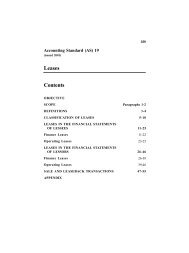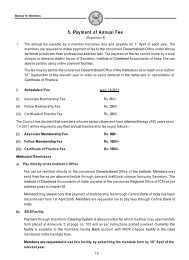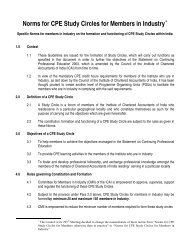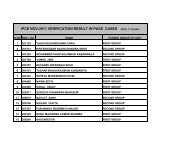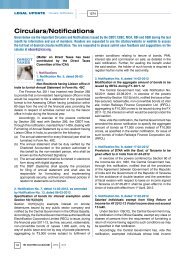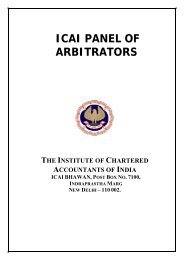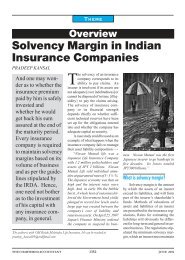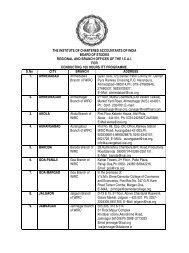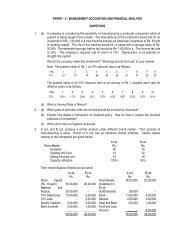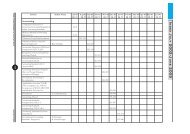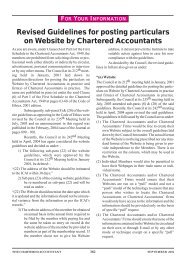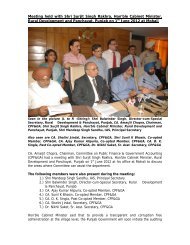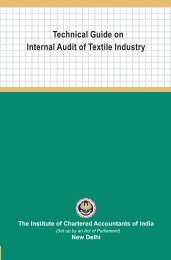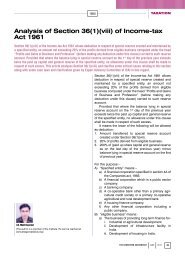The Chartered Accountant
The Chartered Accountant
The Chartered Accountant
Create successful ePaper yourself
Turn your PDF publications into a flip-book with our unique Google optimized e-Paper software.
strategies, and the related<br />
business risks that may<br />
result in material misstatements.<br />
m Matters, which those<br />
charged with governance,<br />
consider warrant particular<br />
attention during the audit,<br />
and any areas where they<br />
request additional procedures<br />
to be undertaken.<br />
m Significant communications<br />
with regulators.<br />
m Other matters, which,<br />
those charged with governance,<br />
consider may influence<br />
the audit of the financial<br />
statements.<br />
l <strong>The</strong> attitudes, awareness, and<br />
actions of those charged with<br />
governance concerning (a) the<br />
entity’s internal control and its<br />
importance in the entity, including<br />
how those charged with<br />
governance oversee the effectiveness<br />
of internal control, and<br />
(b) the detection or possibility<br />
of fraud.<br />
l <strong>The</strong> actions of those charged<br />
with governance in response<br />
to developments in accounting<br />
standards, corporate governance<br />
practices, exchange listing<br />
rules, and related matters.<br />
l <strong>The</strong> responses of those charged<br />
with governance to previous<br />
communications with the auditor.<br />
A19. While communication with those<br />
charged with governance may assist<br />
the auditor to plan the scope and timing<br />
of the audit, it does not change<br />
the auditor’s sole responsibility to establish<br />
the overall audit strategy and<br />
the audit plan, including the nature,<br />
timing and extent of procedures necessary<br />
to obtain sufficient appropriate<br />
audit evidence.<br />
Significant Findings from the<br />
Audit (Ref: Para. 12)<br />
DECEMBER 2008 1096 THE CHARTERED ACCOUNTANT<br />
STANDARDS<br />
A20. <strong>The</strong> communication of findings<br />
from the audit may include requesting<br />
further information from those<br />
charged with governance in order to<br />
complete the audit evidence obtained.<br />
For example, the auditor may confirm<br />
that those charged with governance<br />
have the same understanding of the<br />
facts and circumstances relevant to<br />
specific transactions or events.<br />
Significant Qualitative Aspects of Accounting<br />
Practices (Ref: Para. 12(a))<br />
A21. Financial reporting frameworks<br />
ordinarily allow for the entity to make<br />
accounting estimates, and judgments<br />
about accounting policies and financial<br />
statement disclosures. Open and<br />
constructive communication about<br />
significant qualitative aspects of the<br />
entity’s accounting practices may include<br />
comment on the acceptability<br />
of significant accounting practices.<br />
Appendix 1 identifies matters that may<br />
be included in this communication.<br />
Significant Difficulties Encountered<br />
During the Audit (Ref: Para. 12(b))<br />
A22. Significant difficulties encountered<br />
during the audit may include<br />
such matters as:<br />
l Significant delays in management<br />
providing required information.<br />
l An unnecessarily brief time<br />
within which to complete the<br />
audit.<br />
l Extensive unexpected effort<br />
required to obtain sufficient appropriate<br />
audit evidence.<br />
l <strong>The</strong> unavailability of expected<br />
information.<br />
l Restrictions imposed on the auditor<br />
by management.<br />
l Management’s unwillingness to<br />
make or extend its assessment<br />
of the entity’s ability to continue<br />
as a going concern when<br />
requested.<br />
In some circumstances, such difficul-<br />
ties may constitute a scope limitation<br />
that leads to a modification of the auditor’s<br />
opinion. 11<br />
Significant Matters Discussed, or Subject<br />
to Correspondence with Management<br />
(Ref: Para. 12(c)(ii))<br />
A23. Significant matters discussed, or<br />
subject to correspondence with management<br />
may include such matters as:<br />
l Business conditions affecting<br />
the entity, and business plans<br />
and strategies that may affect<br />
the risks of material misstatement.<br />
l Concerns about management’s<br />
consultations with other accountants<br />
on accounting or auditing<br />
matters.<br />
l Discussions or correspondence<br />
in connection with the initial<br />
or recurring appointment of<br />
the auditor regarding accounting<br />
practices, the application of<br />
auditing standards, or fees for<br />
audit or other services.<br />
Other Significant Matters Relevant<br />
to the Financial Reporting Process<br />
(Ref: Para. 12(d))<br />
A24. Other significant matters arising<br />
from the audit that are directly<br />
relevant to those charged with governance<br />
in overseeing the financial<br />
reporting process may include such<br />
matters as material misstatements of<br />
fact or material inconsistencies in information<br />
accompanying the audited<br />
financial statements that have been<br />
corrected.<br />
Auditor Independence (Ref: Para.<br />
13)<br />
A25. <strong>The</strong> auditor is subject to independence<br />
and other ethical requirements<br />
as enunciated in the Code of<br />
Ethics issued by the ICAI12 A26. <strong>The</strong> relationships and other matters,<br />
and safeguards to be communicated,<br />
vary with the circumstances<br />
of the engagement, but generally address:<br />
11 <strong>The</strong> concept of modification of the auditor’s opinion has been dealt in SA 700, “<strong>The</strong> Auditor’s Report on Financial Statements” (hitherto known as AAS 28). <strong>The</strong> AASB is<br />
however also in the process of developing a Standard corresponding to ISA 705, “Modifications to the Opinion in the Independent Auditor’s Report”.<br />
12 Attention of the members is also invited, for instance, to the Guidance Note on Independence of Auditors, issued by the ICAI.



